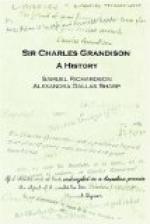This misunderstanding is owing to my officious letter. I should have waited on you in person. I should from the first have put it in your power, to do a graceful and obliging thing. I ask your pardon. I am not used to make differences between man and wife.
I touched first one hand, then the other, of the perverse baby with my lips—Now am I forgiven: now is my friend Beauchamp permitted to return to his native country: now are Sir Harry and his Lady reconciled—Come, come, madam, it must be so—What foolish things are the quarrels of married people!—They must come to an agreement again; and the sooner the better; before hard blows are struck, that will leave marks—Let us, dear madam, find out Sir Harry—
And then, with an air of vivacity, that women, whether in courtship or out of it, dislike not, I was leading her once more to the door, and, as I intended, to Sir Harry, wherever he could be found.
Hold, hold, sir! resisting; but with features far more placid than she had suffered to be before visible—If I must be compelled—You are a strange man, Sir Charles Grandison—If I must be compelled to see Sir Harry—But you are a strange man—And she rang the bell.
Lady Beauchamp, Dr. Bartlett, is one of those who would be more ready to forgive an innocent freedom, than to be gratified by a profound respect; otherwise I had not treated her with so little ceremony. Such women are formidable only to those who are afraid of their anger, or who make it a serious thing.
But when the servant appeared, she not knowing how to condescend, I said, Go to your master, sir, and tell him that your lady requests the favour—
Requests the favour! repeated she; but in a low voice: which was no bad sign.
The servant went with a message worded with more civility than perhaps he was used to carry to his master from his lady.
Now, dear Lady Beauchamp, for your own sake; for Sir Harry’s sake; make happy; and be happy. Are there not, dear madam, unhappinesses enow in life, that we must wilfully add to them?
Sir Harry came in sight. He stalked towards us with a parade like that of a young officer wanting to look martial at the head of his company.
Could I have seen him before he entered, my work would have been easier. But his hostile air disposed my lady to renew hostilities.
She turned her face aside, then her person; and the cloudy indignation with which she entered at first, again overspread her features. Ought wrath, Dr. Bartlett, to be so ready to attend a female will?—Surely, thought I, my lady’s present airs, after what has passed between her and me, can be only owing to the fear of making a precedent, and being thought too easily persuaded.
Sir Harry, said I, addressing myself to him, I have obtained Lady Beauchamp’s pardon for the officious letter—
Pardon, Sir Charles Grandison! You are a good man, and it was kindly intended—




